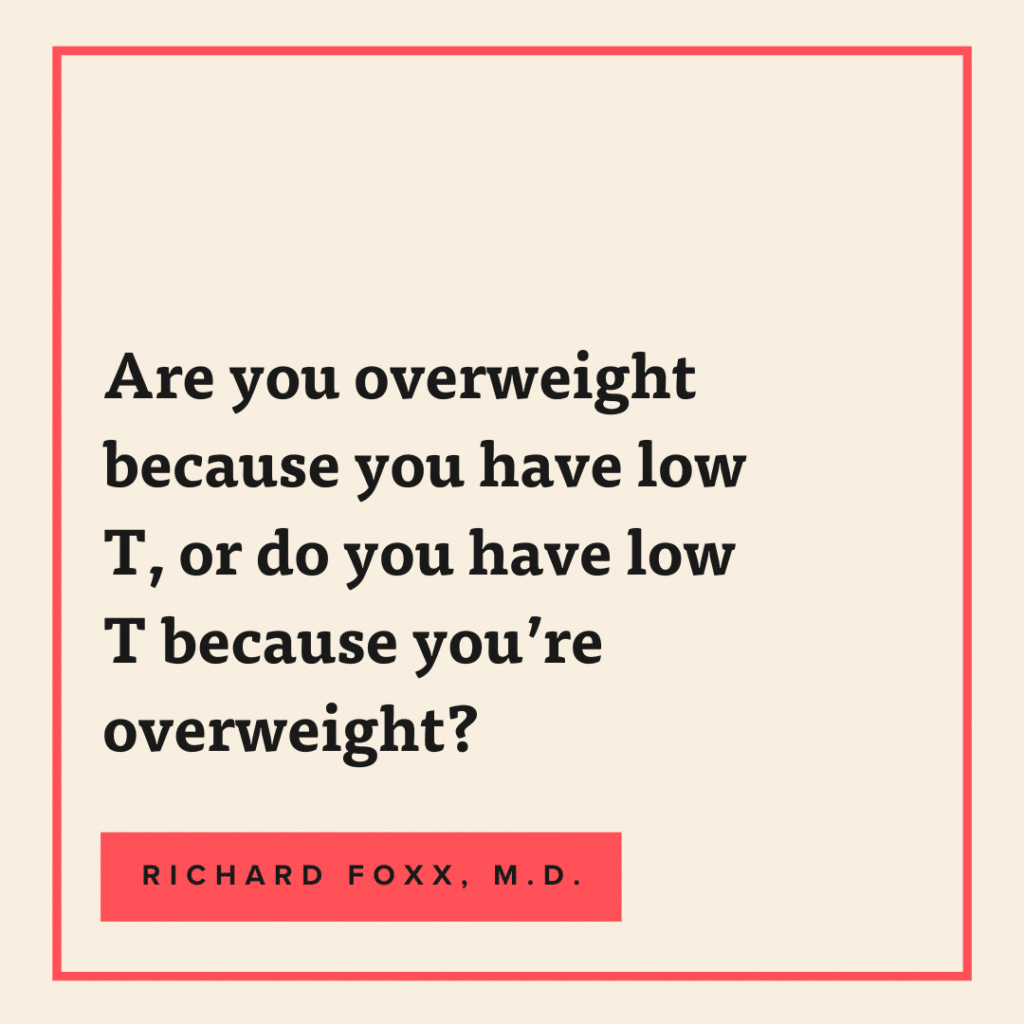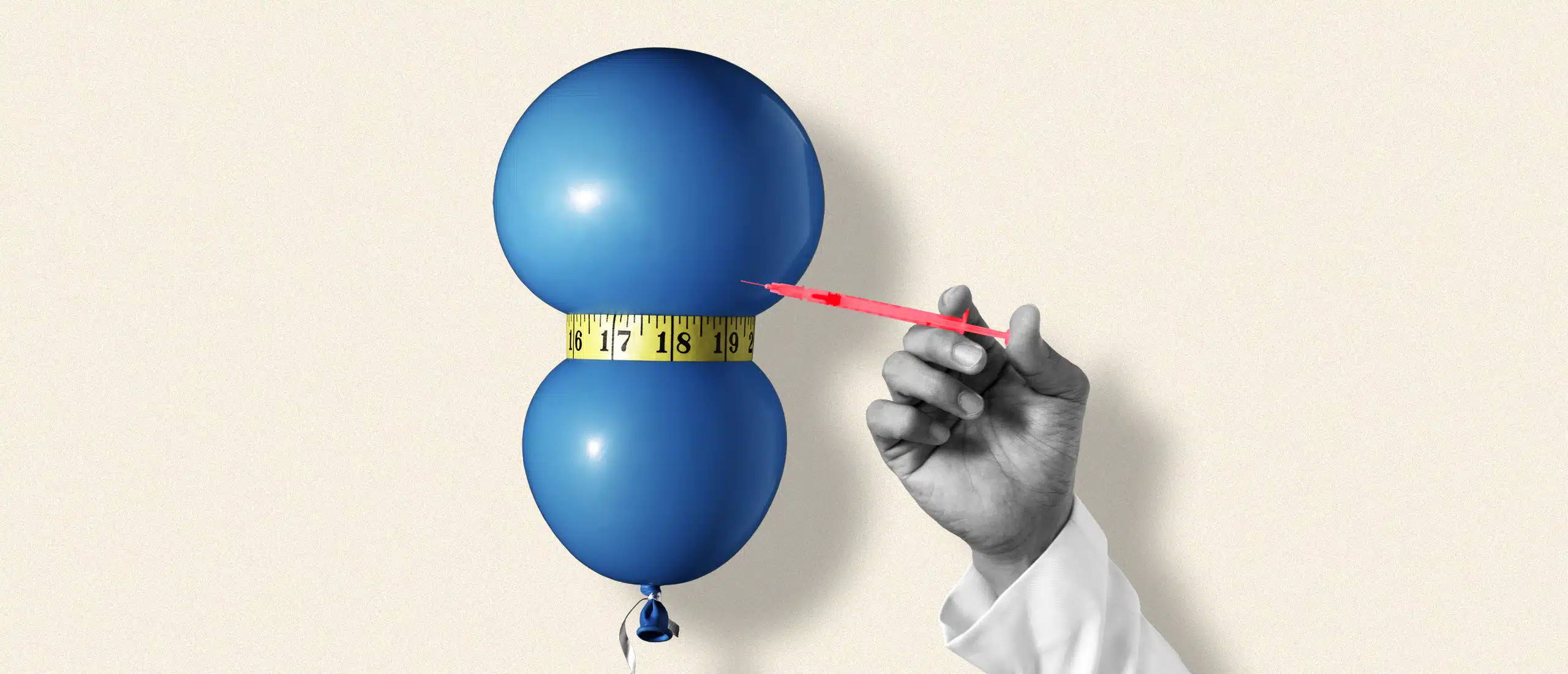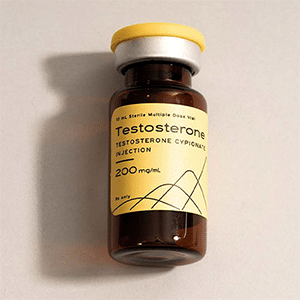Does Testosterone Help You Lose Weight?
- By Lara McGlashan, CPT
- Fact-checked by Joy Ferguson
- July 17, 2023
Back in his military days, at 33, Brian Yoshimura might never have considered testosterone replacement therapy (TRT) as a solve for weight loss, let alone dropping pounds at all. He was ripped and spry. “But 10 years later, at 43, I weighed 285 pounds, and my knees almost gave out just walking to my car,” he says.
Even though Yoshimura still exercised four to five days a week, he struggled to finish a 20-minute workout. “I had to chug energy drinks and coffee just to make it through the day,” he says. It wasn’t until he took a test through Hone that he discovered his testosterone levels were below where they should be for his age.
And there are millions of guys like Brian. Maybe even you.
Back when your metabolism seemed on fire, no matter what you ate or did, you still sported a six-pack. Fast forward and it’s harder to muster the energy to get to the gym, let alone manage your growing waistline.
While lots of things can make it harder to lose weight or maintain it with age, there’s one factor that’s often overlooked: low testosterone.
Low Testosterone and Weight Gain
“The average American male experiences a decrease in testosterone at a rate of about 1 to 2 percent per year, beginning around age 30 to 35,” says Richard Foxx, M.D., a physician who regularly treats men with low testosterone.
“This means that by age 50, you can be down as much as 20 percent. Some men notice it, others don’t, and some just chalk it up to the inevitability of aging.”
Indeed, a study published in the International Journal of Environmental Research and Public Health found that middle-aged men see weight gain as an unavoidable consequence of life (namely, due to family and work commitments), and those interviewed felt helpless and despondent (1).
But the older generations aren’t the only ones experiencing low testosterone, and recent research indicates that the decline might even be skewing younger. A 2021 study found that about 20 percent of adolescent and young adult males (ages 18 to 29) had a testosterone deficiency (2).
How is that possible?
Testosterone and Lifestyle
Modern day habits are mostly to blame, and factors such as sedentary lifestyle, obesity, stress, poor sleep, and alcohol consumption have been shown to have a direct impact on the levels of testosterone in your body (3, 4).
Two of the primary side effects for low T are fatigue and sarcopenia—loss of muscle mass—both of which can lead to weight gain.
“If you lose muscle, you lose your ability to burn as many calories as you did before, because muscle is more active tissue than fat,” Foxx explains. “Low testosterone also decreases your drive to go out and do things such as working out, which also contributes to weight gain.”
Testosterone helps regulate metabolism and body composition, and if you’re deficient, you’re likely to gain weight and experience fatigue. In fact, developing a gut—or male-pattern obesity, as Foxx calls it—may be a sign of low T, and unfortunately, gaining weight around your middle not only looks bad, it also is dangerously unhealthy.
Hone’s at-home testosterone assessment is the simplest way to uncover whether your levels are low. If you qualify for treatment, TRT can be sent right to your door.

The danger of belly fat
Visceral fat raises your risk of serious medical issues such as heart disease, type 2 diabetes, stroke, and even reduced cognitive function, according to a 2023 study published in The Lancet (5).
What’s more, those extra fat cells don’t just sit there looking, well, fat. They actively secrete chemicals into your body, most notably an enzyme called aromatase, which converts testosterone into a type of estrogen.
“If your estrogen is too high, it acts on the pituitary gland—the one that controls your sex hormones and thyroid—and tells it to stop producing testosterone,” Foxx says. “This hormonal imbalance makes it even harder to lose weight. It’s a chicken and egg situation—are you overweight because you have low T, or do you have low T because you’re overweight?”
TRT As a Weight Loss Solution
If you’re struggling to lose weight and a test shows that you have a testosterone deficiency, TRT can help. A 2021 review and meta-analysis of 16 controlled trials found that obese men who were on TRT gained two kg of lean body mass (read: muscle), and helped reduce both waist circumference and body mass index (6).
And in 2019, the Endocrine Society reported that long-term TRT in obese men contributed to prolonged weight loss, with patients losing up to 20 percent of their baseline weight (about 50 pounds), without added risk for mortality of heart issues (7).
Yoshimura’s at-home assessment showed his levels were below the 300 ng/dL that the American Urologic Association says should be considered for treatment. “It came back at 224ng/dL, and I started TRT,” he says.
In one year, Yoshimura lost 50 pounds and 10 inches from his waist. “I feel like a completely different person,” he says.
TRT and Weight Loss: What to Expect
It’s important to note that TRT on its own isn’t a panacea. But when TRT is combined with exercise and other healthy habits, it can help testosterone-deficient men get back on track.
“It takes about three to four weeks to really feel the effects of the treatment, at which point you’ll regain your motivation to exercise and go out and do things,” Foxx says. “As you exercise, your muscle mass will go up and your weight will go down, and most of all, your quality of life improves drastically.”
Drummer Bill Rice gained 70 pounds between ages 31 and 35 before learning low testosterone levels were the culprit. He lacked energy and strength, and felt depressed. Two months into his TRT regimen, he pulled his drums. “I felt alive, banging out the beat like I was on tour again,” he says.
Rice was also able to exercise much more. He worked out five days a week with functional and compound movements. “And at the end of every workout, I would run a few miles or walk a steep incline for 15 minutes,” he says.
Within two years Rice had lost 70 pounds. “With my weight down and energy up, I’m drumming with as much intensity as I was at 31,” he adds.
So are you a candidate for TRT? Get an at-home assessment and find out. You have nothing to lose (well, except your gut) and years to gain. “The human species is the only animal that outlives its reproductive years, but that is no reason to accept the condition you’re in if you can safely prevent it,” Foxx says. “You can absolutely be in your 70s and still be vital and alert and energetic.”
Hone’s at-home testosterone assessment is the simplest way to uncover whether your levels are low. If you qualify for treatment, TRT can be sent right to your door.
References
1. Cortnage, M., & Pringle, A. (2022). Onset of Weight Gain and Health Concerns for Men: Findings from the TAP Programme.
2. Lokeshwar, S., et al. (2021). Decline in Serum Testosterone Levels Among Adolescent and young Adult Men in the USA.
3. Leproult, R., & Van Cauter, E. (2011). Effect of 1 Week of Sleep Restriction on Testosterone Levels in Young Healthy Men.
4. Emanuele, MA., & Emanuele, N. (1998). Alcohol’s Effects on Male Reproduction.
5. Mina, T., et al. (2023). Adiposity impacts cognitive function in Asian populations: an epidemiological and Mendelian Randomized study.
6. Mangloim, A, et al. (2021). Effectiveness of testosterone replacement in men with obesity: a systematic review and meta-analysis.
7. The Endocrine Society, Endocrine News. (2019). The Long Haul: Treating Men with Obesity with Testosterone.














